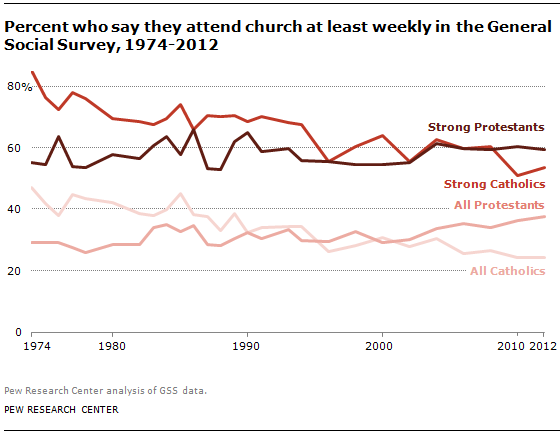(source: pewforum.org)
The Catholic Church has a mass attendance problem–some would say a crisis. Less than a quarter of Catholics in the United States attend Mass on a weekly basis. The question I have is: how do we go about fixing the problem? And further, is what we’re doing now working?
In general, it seems to me, that it is an issue of two groups:
- the people who aren’t there and
- the people who are there.
We can focus on either one or the other in order to fix the problem. In other words, our two goals might be:
- Get more people to come to Mass on Sunday.
- Get more people to talk about Sunday Mass.
If we don’t get #2 right, then it won’t matter how successful we are at #1.
Focus on the People Who Aren’t There
It is easy to get transfixed with the people who aren’t there. Let’s face it, most of us are just plain angry. I’ve had many, many religion teachers and catechists email me with complaint after complaint about how parents aren’t bringing their kids to Mass each weekend. It is a problem I hear from religious educators all across the United States and in other countries as well.
What happens when we focus on the people who aren’t there?
One way parishes are trying to fix the problem is make Sunday mass a requirement. I’ve heard some places even having sign-in sheets for parishioners. Others hold to the envelope system even though they offer a digital donation option. It is a big effort to try to track who’s coming and keep people accountable (whether they want to be there or not).
Campaign after campaign–taking tips from the advertising industry–have tried to appeal to people with commercials and subway adds to come back to Church. Maybe you have seen or even participated in one of these campaigns in your diocese?
The people come back and then they go. Why isn’t it working?
Focus on the People Who Are There
There is a good way and a bad way to focus on the people in the pews to increase Mass attendance.
One way is to try to give them what they want to keep them from leaving. Get a sense for the music they like and the optimum length of time Mass should run. Do everything you can to try to keep them from leaving.
The other way, and the only solution I see working in the long-term, is to create an experience that they can’t keep to themselves.
Make it unique and memorable.
Make it incredibly easy and natural for people to invite their friends to Mass. Give them something worth talking about.
Do people in your parish talk about their Mass experience? Do they talk about their experiences with the liturgy?
Are any of these elements of your Sunday liturgy worth sharing with people who aren’t there:
- homily
- music
- communion rite
- Eucharistic meditation
- prayers of the faithful
- Children’s Liturgy of the Word
- seating
- architecture
- art
- a welcoming community
- a community of service
If your parishioners aren’t excited to talk about one or all of these things, then start there. In fact, focus on one thing and make it great. Be the _____ parish (you fill in the blank) that every parishioner can’t help but talk about with their friends.
The more you can get people to talk about their experience on Sunday, the more you will see people show up again.
If it isn’t worth talking about and it isn’t worth sharing, then why try to get the people who aren’t there to come back?




Thanks, Jared. We are in an “experience economy” and your strategy of focusing on the experience for those who are there is a fresh, but it-should-have-been-obvious approach. It’s tough because the different liturgical ministers have a hard time evaluating the pieces of what is going on or accepting that critique. It may mean having the diocesan Office of Worship run an evaluation, which many are willing to do.
Thanks Frank!
The evaluation part is really, really difficult. Maybe impossible. Liturgy is an art not a science and, therefore, very difficult to measure. We’re not going to make everyone happy all the time. All we can really do is focus on making that experience an encounter with Christ as best we can. If the homily, music, community, prayers, etc. create an openness to and way to that encounter, we’ll give them something to talk about.
I guess that I had worked as the “downtown” liaison too long to think that my suggesting a starting point to a particular person or staff would make a difference.I was a vicariate catechetical coordinator. Sometimes my consultation would lead to successes. Your “etc.” above includes a whole list of important things. I would put “presider style” as one of the top components. If liturgy (all sacraments) is an art form, The presider is the artist. And it all begins with the greeters at the door, the demeanor of those assembled, and the opening procession.
Love this: “And it all begins with the greeters at the door, the demeanor of those assembled, and the opening procession.”
As a converting catholic with a cradle catholic husband I feel for this. I cannot recommend going to Mass to my friends *AT ALL*. Even to those who I feel would benefit and love it. Why you say? Because it will make them want to convert, and then go through the horrific RCIA program and more than likely hate me and drop out. Then proceed to go to church somewhere that they WANT people to convert and participate and invite them in to share this life. Where conversions is made welcoming, simple and embraces the convert as an adult. I am mid RCIA and if I was not so steadfast and sure in my decision I would simply stop going. It is the most mindnumbing waste of over an hour of my week. If I miss I am hounded by phone calls, emails, and facebook messages forcing me to explain my absence and “rectify” the missed time. As a participant in the classes who knows and has already explored (as have most catechists) and understands the basic tenants of the church I need something more. And so do the others sitting with me. The Catholic church for the most part cannot meet the spiritual desires of so many. It is so concerned with teaching to the basic that it seems to have forgotten that most of those attending church desire a study of the religion on a deeper level. Not something to “make us feel good” but rather, something to spark thought and light a fire of desire to learn and know more.
First of all, Kate, thank you for sharing your experience. Your passion and steadfast determination make me hopeful and excited for the Church’s future. As you make plain, it’s more than just the liturgy that we need to improve. There are just so many areas in which we need to make a difference. I hope you can forgive the people behind your RCIA program. I trust they truly are well intentioned and doing their best. The RCIA process is still in its infancy for the Church and I believe the Spirit will continue to work within the hearts of those who volunteer and organize such catechesis. You’re right. We have a lot of work to do.
The first thing I did when I became RCIA director at my parish was to take the entire library that had been collected from the 1980’s dedicated to “building an RCIA program” and threw it away. The models from that time are sappy, and the material is about 8th grade level. I suffered through it as a candidate in 2001. At this point, I have no “program” as such, but a systematic way of teaching theology that is tailored each year to the participants. This is no easy task when some catechumens in my inner city parish have barely finished high school, and others have advanced degrees and have studied the Church for years. Furthermore, some are simply looking to “make their confirmation” and others have followed Jesus in a protestant denomination with all their hearts since childhood. May God guide you to individuals who can help you find the deeper levels you seek, and may He reveal to you the richness of his glory which can be found in His Church.